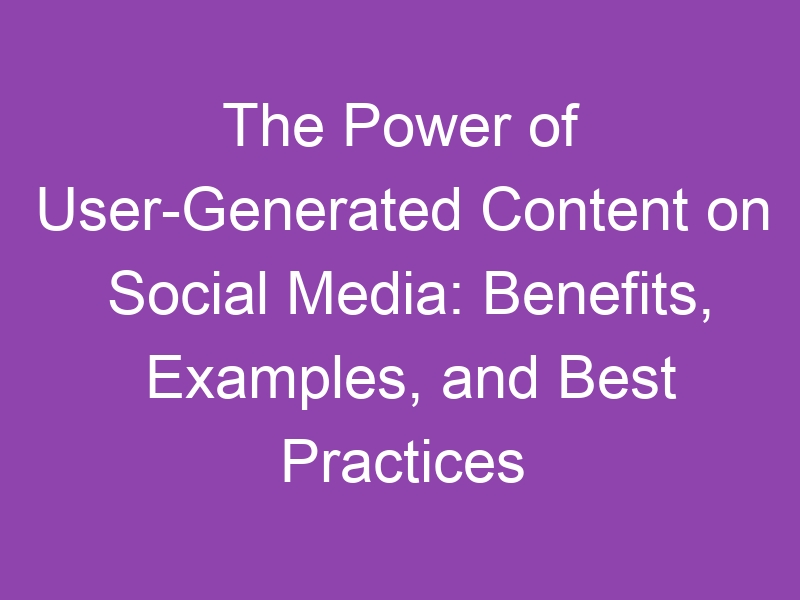Content Outline
- Introduction
- A. Definition of User Generated Content Moderation
- B. Importance of User Generated Content Moderation
- Challenges of User Generated Content Moderation
- Benefits of User Generated Content Moderation
- Best Practices for User Generated Content Moderation
- Tools and Technologies for User Generated Content Moderation
- Conclusion
Introduction
User generated content moderation is an essential aspect of online communities, ensuring that the content shared is appropriate and safe for all users. With the rise of social media and online forums, the need for effective moderation has become increasingly important. In this post, we will discuss the key factors involved in user generated content moderation.
The Importance of User Generated Content Moderation
User generated content can range from harmless posts and comments to harmful and inappropriate content, such as hate speech and cyberbullying. Effective moderation ensures that such content is removed, creating a safe and welcoming community for all users. According to a report, 59% of consumers believe that social media platforms should be responsible for moderating harmful content.
The Challenges of User Generated Content Moderation
While moderation is essential, it can also pose challenges. Moderators must navigate a delicate balance between free speech and content that is harmful or inappropriate. Additionally, the sheer amount of user generated content can make it difficult for moderators to keep up with the volume of posts and comments. According to a report, 61% of consumers believe that social media platforms do not do enough to moderate content.
The Role of Technology in User Generated Content Moderation
Technology has played a significant role in user generated content moderation, with many platforms implementing automated moderation systems. However, these systems are not foolproof and can result in false positives or false negatives. According to a survey, 49% of consumers do not trust social media platforms to properly moderate content.
In conclusion, user generated content moderation is a crucial aspect of online communities. While it poses challenges, effective moderation is essential in creating a safe and welcoming environment for all users.
Introduction – A. Definition of User Generated Content Moderation
User generated content moderation refers to the process of reviewing and filtering user-generated content on online platforms to ensure that it complies with the platform’s policies and guidelines. This can include text, images, videos, and other forms of content that users submit to the platform.
Effective user generated content moderation is essential for maintaining a safe and healthy online community. It helps to prevent spam, hate speech, harassment, and other forms of harmful content from being published on the platform. It also ensures that the content on the platform is relevant and high-quality, which can improve user engagement and retention.
However, user generated content moderation is a complex and challenging task. Moderators must balance the need to uphold platform policies with the need to respect user freedom of expression. This can involve making difficult decisions and tradeoffs.
Key Factors in User Generated Content Moderation
- Platform Policies: The platform’s policies and guidelines are the foundation for user generated content moderation. These policies should be clear, consistent, and regularly updated to reflect changing community standards and legal requirements.
- Moderation Team: The moderation team is responsible for reviewing and filtering user-generated content. They should be well-trained and have clear guidelines for decision-making. It’s also important to ensure that the team is diverse and representative of the platform’s user base.
- Moderation Tools: Moderation tools, such as automated filters and machine learning algorithms, can help to improve the efficiency and accuracy of user generated content moderation. However, these tools are not foolproof and may require human oversight.
- User Feedback: User feedback can provide valuable insights into the effectiveness of user generated content moderation. Platforms should have clear channels for users to report harmful content and provide feedback on moderation decisions.
User generated content moderation is a critical component of online community management. Platforms that prioritize effective moderation can create a safer and more engaging user experience for their users.
(Keyword: user generated content moderation)
Introduction – B. Importance of User Generated Content Moderation
User generated content (UGC) has become an essential part of online platforms. It includes any content created and shared by users on social media platforms, forums, and websites. While UGC can be valuable in attracting and engaging users, it has become increasingly important to moderate it to ensure its quality and safety.
The importance of UGC moderation cannot be overstated. It helps to create a safe environment for users, protect brand reputation, and comply with legal requirements. A study by Trustpilot found that 90% of consumers read online reviews before making a purchase. Therefore, UGC moderation plays a crucial role in maintaining the credibility of online reviews and influencing consumer behavior.
Moreover, online platforms have a responsibility to ensure that their users are not exposed to harmful or offensive content. In 2020, 42% of adults in the US reported being exposed to hate speech online. This highlights the need for UGC moderation to protect users from such content.
In conclusion, UGC moderation is essential for maintaining the quality and safety of online platforms. It helps to protect users, maintain brand reputation, and comply with legal requirements. Therefore, platforms should invest in effective UGC moderation tools and strategies to provide a safe and trustworthy environment for their users.
Challenges of User Generated Content Moderation
With the rise of social media and online platforms, user generated content has become a significant source of information and entertainment for millions of users worldwide. However, moderating this content can be a daunting task for content creators and platform owners. Here are some of the challenges they face:
- Volume: User generated content is produced in massive quantities, making it difficult to monitor and moderate. For instance, Facebook has over 2.7 billion active users who generate an estimated 350 million photos per day.
- Subjectivity: Moderating user generated content involves making subjective decisions about what is appropriate and what is not. This can be challenging as different people have different values, beliefs, and opinions.
- Cost: Moderating user generated content can be expensive, especially for small businesses and startups. Hiring moderators and developing automated moderation tools can be costly.
- Legal issues: Moderating user generated content can also raise legal issues, such as copyright infringement, defamation, and privacy violations. Content creators and platform owners must ensure that they comply with relevant laws and regulations.
Despite these challenges, user generated content moderation is crucial for maintaining a safe and healthy online environment. It helps to prevent cyberbullying, hate speech, and other forms of online abuse. Moreover, it can improve the quality of user generated content by filtering out low-quality and irrelevant content.

For more information on user generated content moderation, check out this article by Social Media Examiner.
Benefits of User Generated Content Moderation
User generated content (UGC) moderation is the practice of monitoring and managing user-generated content on websites, social media platforms, and other online forums. UGC moderation can have several benefits for businesses and online communities.
- Improves the quality of content: UGC moderation helps to ensure that the content posted on a website or social media platform is of high quality and relevant to the topic or theme. This can help to improve the user experience and increase engagement.
- Reduces legal risks: UGC moderation can help to reduce the risk of legal issues such as copyright infringement, defamation, and privacy violations. By monitoring and removing inappropriate content, businesses can protect themselves from potential legal action.
- Enhances brand reputation: UGC moderation can help to enhance a brand’s reputation by ensuring that the content posted by users is aligned with the brand’s values and messaging. This can help to build trust and credibility with customers.
- Encourages user participation: UGC moderation can also encourage user participation by creating a safe and welcoming environment for users to share their thoughts and opinions. This can lead to increased engagement and a more vibrant online community.
According to a study by Stackla, 90% of consumers say that authentic content from users is helpful in their purchase decisions. However, UGC moderation does have some tradeoffs. It can be time-consuming and costly to monitor and manage large volumes of user-generated content, and businesses must balance the benefits of UGC with the resources required to moderate it.
Overall, UGC moderation can have significant benefits for businesses and online communities. By improving the quality of content, reducing legal risks, enhancing brand reputation, and encouraging user participation, businesses can create a more engaging and trustworthy online presence.
Best Practices for User Generated Content Moderation
User generated content is a valuable source of information and engagement for websites and mobile applications. However, it also poses a risk of inappropriate content such as hate speech, spam, and fake news. Therefore, it is essential to have a robust content moderation strategy in place. Here are some best practices for user generated content moderation:
- Establish clear guidelines: Set clear guidelines for what is acceptable and what is not. Communicate these guidelines to users and make them easily accessible.
- Use automated tools: Use automated tools such as filters and machine learning algorithms to flag potentially inappropriate content.
- Train your moderators: Provide proper training to your moderators to help them identify and handle problematic content effectively.
- Encourage user reporting: Encourage users to report inappropriate content by providing an easy-to-use reporting system.
- Regularly review your guidelines: Regularly review and update your guidelines based on feedback and changes in the online environment.
According to a Statista report, user-generated content accounts for a significant portion of social media activity. With the rise of fake news and hate speech, it is more important than ever to have a solid user generated content moderation strategy in place. By following these best practices, you can ensure that your platform is a safe and welcoming space for all users.
Tools and Technologies for User Generated Content Moderation
With the rise of user-generated content on the internet, it has become increasingly important for businesses and organizations to maintain a safe and reputable online presence. User-generated content moderation is the process of reviewing and filtering user-generated content to ensure it meets certain standards of appropriateness, legality, and brand alignment. Here are some of the tools and technologies available to help with user-generated content moderation:
1. Automated Content Moderation
- Automated content moderation technologies use machine learning algorithms to analyze and filter content in real-time.
- These technologies can help flag potentially inappropriate content and reduce the workload for human moderators.
- However, automated moderation is not foolproof and can sometimes result in false positives or negatives.
2. Human Content Moderation
- Human moderators are trained to review user-generated content and ensure it meets certain standards.
- This approach can be more accurate and nuanced than automated moderation.
- However, it can be more time-consuming and expensive.
3. Content Moderation Services
- Content moderation services are third-party companies that provide moderation solutions for businesses and organizations.
- These services can be tailored to meet specific needs and can include a combination of automated and human moderation.
- However, outsourcing moderation can result in loss of control over the moderation process and potential privacy concerns.
Effective user-generated content moderation is essential for maintaining a strong online reputation and protecting brands from legal and reputational risks. By using a combination of automated and human moderation, businesses and organizations can strike a balance between efficiency and accuracy in their moderation efforts.
Sources: Brandwatch, Hootsuite
Conclusion
In conclusion, user-generated content moderation is a crucial aspect of online platforms. As we have seen, it is important for platforms to strike a balance between freedom of expression and ensuring that their content is appropriate, trustworthy and safe for users.
There are various methods of user-generated content moderation, including manual moderation, automated moderation and a combination of both. Each method has its own advantages and disadvantages, and platforms need to carefully consider which approach best suits their needs.
However, no matter which method is chosen, it is clear that moderation is necessary. Without moderation, platforms run the risk of allowing harmful or inappropriate content to proliferate, which can damage their reputation and put their users at risk.
It is also important to note that user-generated content moderation is an ongoing process. As online communities evolve and new challenges arise, platforms need to adapt their moderation strategies accordingly.
Overall, the importance of user-generated content moderation cannot be overstated. It is a crucial aspect of ensuring that online communities are safe, trustworthy and valuable for all users.
For more information on user-generated content moderation, check out this article by MIT Technology Review, and this article by The New York Times on the challenges of moderating misinformation on social media.



